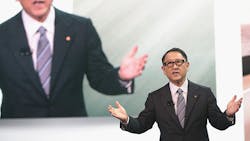Toyota Needs These Japanese Startups on the Road to Robocars
When it comes to cracking the code for self-driving cars, startups have an edge on big business, according to computer scientist Katsuya Uenoyama.
That might sound like bravado coming from the co-founder of a venture with just 30 employees working out of a small office in Tokyo, but Toyota Motor Corp. apparently agrees. Last week, the automaker made a $9.1 million investment in the initial public offering of Uenoyama’s firm, PKSHA Technology Inc. (pronounced pahk-sha), which is developing software that could one day help cars learn to hold a conversation with drivers.
“The digital needs of the manufacturing sector have become bigger and bigger, and that’s why we started working with Toyota,” said Uenoyama in a recent interview at his office near the University of Tokyo, where the 35-year-old received a Ph.D. in machine learning.
Toyota’s investment in PKSHA, and another Tokyo startup called Preferred Networks Inc., comes as software starts to rival the motor as the most important thing inside a car, and automakers compete with the likes of Google to make vehicles that can drive by themselves. The market for artificial intelligence know-how is so hot that small firms, sometimes with no products, are attracting investment from corporate giants that simply want access to programmers and a pipeline to the latest research.
On its first day of trading, last Friday, PKSHA’s shares more than doubled, bringing its market value to $667 million and making Uenoyama’s 38% stake worth about $250 million, according to data compiled by Bloomberg. Toyota owns 2.7%.
Even without a marketing department, Uenoyama says PKSHA is on pace this year to double revenue from licensing its algorithms to nearly a billion yen, or about $9 million.
A Land of Collaboration
Once known for taking pride in doing everything by itself, Japan’s biggest carmaker has been more open to collaboration ever since Akio Toyoda took over in 2009. An alliance with Tesla Inc. fizzled amid a reported clash of cultures, but the automaker agreed this year to partner with Suzuki Motor Corp. on things including electric vehicle technology and to build a U.S. factory with Mazda Motor Corp. In June, Toyoda told shareholders that the almost 80-year-old company founded by his grandfather was considering all options including mergers and acquisitions to get more competitive.
In the autonomous car race, though, Toyota appears to be behind. General Motors Co., which spent $581 million last year to buy San Francisco-based startup Cruise Automation, says it already has a driverless car ready for mass production. By sometime around year-end, Tesla is promising to stage a road trip from Los Angeles to New York using a car that will be able to navigate city streets and even park entirely on autopilot.
Toyota is aiming for 2020, with a more conservative goal of having vehicles that can steer themselves on highways, where driving is less demanding.
To speed up development, Toyota spent $1 billion in 2015 to build a Silicon Valley AI research lab, and is said to be considering opening a hub in Tokyo next year. In July, the automaker established a $100 million venture fund to go out and find new technologies.
“AI is key to autonomous driving, but car companies aren’t very familiar with the technology, which is why they definitely need help from outside,” said Tatsuo Yoshida, an analyst at Tokyo’s Sawakami Asset Management Inc.
In August, Toyota sunk $94 million into Preferred Networks, adding to an earlier $9 million investment in the deep learning startup and becoming its biggest outside shareholder. In a statement, Toyota said the new money was meant to “accelerate joint research and development.”
The Fastest Path
At a recent public forum in Tokyo, a Toyota executive invited Preferred Networks’ co-founder Toru Nishikawa on-stage to narrate a video showing how his technology enabled toy cars to learn not to crash into each other. At first, the miniature Priuses could barely move around an obstacle course without colliding. After two hours of trial and error, though, they were zipping around as if they had professional drivers inside.
In an interview this month, Nishikawa said he’d chosen to work with Toyota rather than other carmakers because that was the “fastest path to safe autonomous driving.”
At PKSHA, Uenoyama wouldn’t provide many details about the company’s research, but he said Toyota is particularly interested in its voice recognition technology, which will be more important as the steering wheel becomes a thing of the past and talking becomes the main way drivers interact with their vehicles.
A spokeswoman for the automaker, Akiko Kita, said Toyota had invested because of PKSHA’s “highly advanced technologies in natural language processing and image recognition.”
Uenoyama said a four-year stint as a consultant in Silicon Valley convinced him that the world of manufacturing had become too bureaucratic given how fast technology was changing. After starting PKSHA five years ago, though, he realized this was a business opportunity.
“From an engineer’s point of view,’’ he said last week at a press conference after his IPO, “the cars of the future will just be big computers.’’
By Kevin Buckland and Ma Jie
About the Author
Bloomberg
Licensed content from Bloomberg, copyright 2016.
